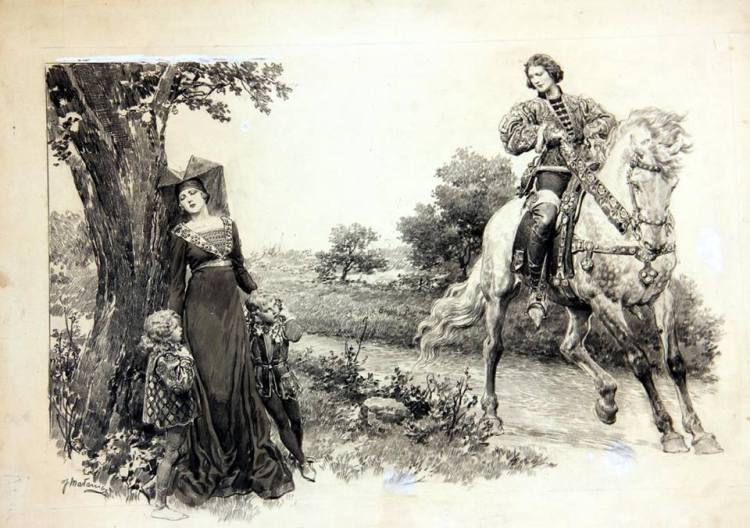May 1 has just gone past–a date known in ancient Britain as the Feast of Beltaine, the ‘Fires of Bel (the Shining One)’. Of all the old important pre-Christian dates, this is the one that the Church was never able to Christianise in any obvious way, retainings its traditions of merriment, dancing and bawdiness right down to the present. Even Halloween (All Hallows) had a vague Christian veneer placed over its supernatural and ancestral elements, and Midsummer’s Eve was associated with St John as well as with the summer Solstice several days earlier and the burning hilltop bonfires.
It was of course on May 1 that Edward IV was supposed to have married Elizabeth Woodville, in a secret ceremony attended by her mother, a priest and child. The date is interesting, as May marriages were at one time considered to be unlucky. An old rhyme goes ‘Marry in the month of May and you will surely rue the day.’ The reason for this was that the time of the year was considered to be a frivolous one, connected with faithlessness and a lack of constancy.
May 1 in particular was the time for ‘greenwood weddings’–temporary ‘marriages’ that were of dubious legality. Often these, if they lasted longer than a few nights, went on no longer than the traditional ‘year and a day’ of old-time fairy stories. The couple would then part, if they wished, and go on their seperate ways, no harm done.
Unless you were a king of England, of course, who may well have already pre-contracted a marriage in a similar style and who was expected to marry a foreign princess…
The fact that several sources quote May 1 as the date of Edward’s wedding is interesting. It may quite literally be the case…or it could well be that the writers (or those from whom they had gleaned the information from) were aware of the traditional significance of May 1 in regards to impermanent, irregular marriages.
Indeed, far be it from the idea some traditionalists seem to take, that Edward’s marriage was perfectly acceptable to all before Richard ‘invented’ the idea of a pre-contract, it seems that that many already had doubts of its legality. Mancini, for instance says that Elizabeth Woodville, years before the events of 1483, was reproached with calumnies ‘namely that according to established usage she was not the legitimate wife of the king.’ He seemed to believe this was because she had been married before and hence was not a virgin, but there was no such impediment to marriage within the English royal house–Eleanor of Aquitaine,for instance, had been married and had several children before espousing Henry II. So it had to be something else. Later Mancini mentions Edward being legally contracted to another woman. He mistakes this for Bona of Savoy, who Warwick sought as a bride for Edward, and he does not seem to doubt the veracity of this ‘proxy marriage’, although he has the wrong woman.
Certainly, it seems that many people in late medieval England believed *something* was irregular about Edward and Elizabeth’s marriage, and giving it the traditional May 1st day may well be affirming that fact.
A recent article from History Today on Edward’s marriage and those of his infamous grandson Henry VIII:
http://www.historytoday.com/eric-ives/marrying-love-experience-edward-iv-and-henry-viii

Agreed about the May Day connection. I don’t think Edward ever intended it to be a true marriage. He was young and thought he could get away with anything, after all, he’d already done it once without consequence. He was ruled by the rampant teenaged contents of his codpiece, and wasn’t mature enough to deal with the situation he’d created. I do not think love was involved, but lust certainly was.
He allowed his annoyance with Warwick to get in the way, and thus stumbled into making the very worst of a bad thing. Definitely the curse of May Day. But at least he had the consolation of knowing Elizabeth Woodville was proven to be ‘fruitful’. The only consolation, I imagine, given the turmoil he was encouraging. When his health began to fail, and death crept closer than he ever expected, he MUST have known he would be handing an invisible death warrant to his loyal younger brother. The clamouring Woodvilles were NEVER going to give up their power and prominence, and Richard would be all that stood in their way.
I wonder if, could Edward have seen into the future, he would still have admitted to this secretively dishonourable match? After all, it was bigamous, and therefore not legal. So, when his real wife, the obediently silent Eleanor Talbot, died a few years later, he could quite properly marry again. Probably the safe, advantageous foreign match that was expected of him in the first place. But he wanted to discountenance Warwick and so stabbed himself in the foot by announcing Elizabeth Woodville as his queen.
Any children born of a post-Eleanor foreign match would have been undeniably legitimate. Then, on the understanding that Edward would still die young (his salacious lifestyle wasn’t really likely to change much because he had a grand foreign queen!) Richard would not have been in danger when he became Lord Protector during the minority of the heir (if there was one). And when the new monarch reached his majority, Richard, if he wished, could return to his beloved north and live his full allotted time.
So, that shoddy May Day fakery with EW was doomed from the outset, and led to so much pain and bloodshed that I hope Edward was looking down (or up) and suffering agonies of conscience. He should, because he and his overactive codpiece were directly responsible for the advent of the Tudors!
Well, that’s how I see it. No doubt others have a different view of it.
LikeLiked by 2 people
Very interesting post -thanks
LikeLike
Reblogged this on TrueTudors and commented:
Interesting theory about the marriage of Henry VIII’s grandparents, King Edward IV and Elizabeth Grey (nee Woodville)
LikeLike